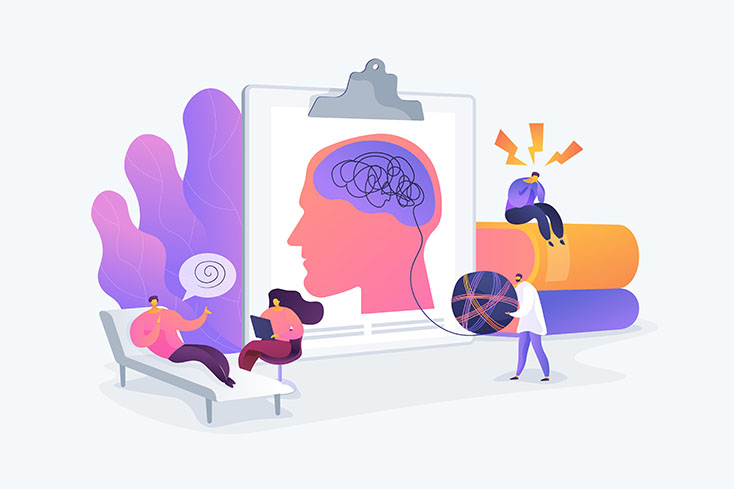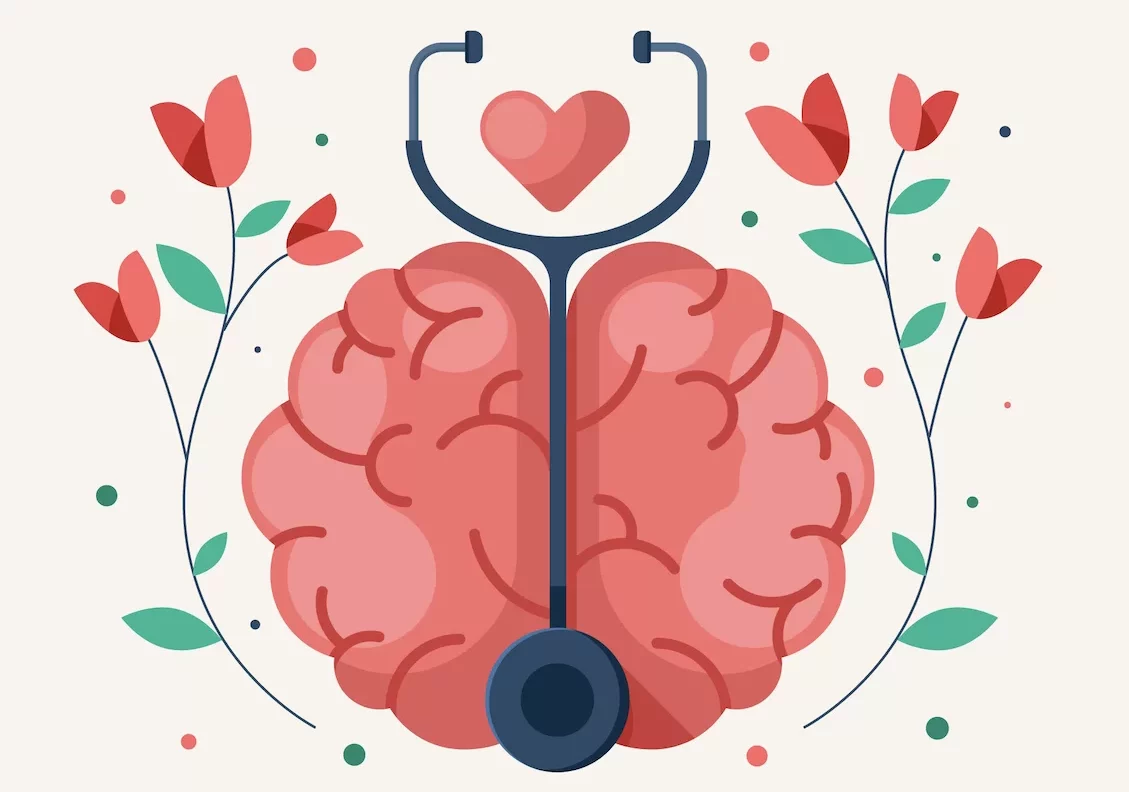Hormones are powerful biological compounds that regulate many aspects of our health, including mood, stress response, and overall mental well-being. Directly influencing the activity and function of various organs and tissues, they act as biological messengers, orchestrating body functions in response to a range of physical and psychological stimuli.
Understanding the intimate connection between hormones and mental health is crucial not only for mental health professionals but individuals striving to optimize their well-being. In this article, we delve into the pivotal role of hormones like cortisol, estrogen, and testosterone, exploring their influence on emotions and mental states. We also offer accessible insights into strategies individuals can adopt to achieve better hormonal balance and foster improved mental health.
Understanding Hormones: Fundamental Regulators of Bodily Functions
In essence, hormones are the body’s chemical messengers, produced by various glands in the endocrine system. They are responsible for controlling, coordinating, and regulating most major bodily functions, from simpler ones such as hunger and sleep to more complex processes like reproduction, emotions, and mood. Each hormone has a particular function and interacts with specific cells in the body, fitting into them like a key into a lock.
How Hormones Work
Hormones are released by glands in the endocrine system into the bloodstream, from where they travel to tissues and organs, influencing their function. Upon reaching their target cells, they bind to specific receptor sites, triggering changes in the cell’s function. This can manifest as alterations in behavior, physical attributes, or metabolic reactions.
To maintain a balanced state, hormone production is regulated via a complex process called a negative feedback system. For instance, when blood sugar levels rise, the pancreas secretes the hormone insulin, which aids in the absorption of glucose into cells, bringing blood sugar levels back to a balanced state. Once this balance is achieved, the release of insulin is decreased.
Each hormone impacts the body in different ways, and imbalances can lead to diverse symptoms and health issues. For example, an overproduction of the thyroid hormone can result in weight loss, increased heart rate, and anxiety, while an underproduction can lead to weight gain, fatigue, and depression.
Fundamentally, the human body relies on this symphony of hormones, each playing its part at the right time and in the right measure, allowing us to function optimally. Achieving hormonal balance is, therefore, vital to guiding the body’s function and promoting overall health and well-being.

Hormones and Mental Health
Hormones play an intricately intertwined role in neurological health, with different hormones distinctly influencing behavior, mood, and overall mental health. They work on a variety of cognitive mechanisms, triggering a broad spectrum of emotional responses and behavioral attributes.
One particular example is cortisol, commonly known as the “stress hormone”. Cortisol is produced by the adrenal glands under stressful conditions, mobilizing the body’s fight-or-flight response. However, research indicates that prolonged exposure to elevated cortisol levels can lead to a spectrum of health problems, including psychological disorders. This underlines the critical importance of effective stress management in promoting mental wellness.
Sex hormones, such as estrogen and testosterone, are primary determinants of mood and behavior. They exert profound effects on the brain and mental well-being. In women, for instance, fluctuations in estrogen levels during menstruation can noticeably influence mood and emotional state.
Hormones also play a vital role in cognitive function, with emerging research showing how hormonal changes can affect neuronal networking and cognitive function mechanisms. The relationship between hormones and cognition bears importance not just in understanding mood disorders but a broader spectrum of neurological health areas.
Taking all these into account, the pivotal role of hormones in mental health is evident. Understanding the influence of hormones on mental well-being can hence significantly contribute to devising effective treatments and preventative strategies.
This complex relationship between hormones and mental health validates the importance of maintaining hormonal balance within the body, underscoring the cascading impact hormonal imbalances could have on mental health.
Stress, Mood, and Physical Vitality
Owing to their intrinsic role in regulating diverse physiological functions, hormones wield significant power in steering our mental health. It is vital to understand each hormone’s influence, the impact of imbalances, and the associated emotional profiles. Let’s delve deeper into how cortisol, estrogen, and testosterone influence our mental states.
Cortisol: The Stress Hormone
Cortisol, known colloquially as the “stress hormone,” is a crucial component of our body’s response to stressful experiences. When we encounter a stressor, our adrenal glands secrete cortisol to prime the body for a “fight or flight” response. This action involves several physiological shifts — rapid heart rate elevation, increased glucose for energy uptick, augmented alertness — a comprehensive mobilization to empower us to quickly react to perceived threats.
However, the necessity of managing stress effectively becomes evident when considering the detrimental effects of chronic cortisol exposure. If our bodies are continually set to high alert, cortisol levels remain persistently elevated, taking a toll on our mental health. This chronic hyperarousal can contribute to the development or exacerbation of anxiety and depression. High cortisol levels can also interfere with other aspects of cognitive function, leading to issues such as memory impairment and difficulty concentrating.
Estrogen: A Mood Regulator
Estrogen, predominantly recognized as a female sex hormone, plays an integral role in mood regulation. By modulating the levels of serotonin — a neurotransmitter critical for sustaining a positive mood — and other mood-related neurotransmitters within the brain, estrogen promotes a general sense of well-being. It also facilitates neuroprotection and synaptic plasticity, further solidifying its role in supporting mental health.
Nevertheless, entirely comprehending estrogen’s impact necessitates acknowledging how fluctuations can impact mental states. These fluctuations occur naturally, particularly during distinct life phases such as menstruation, pregnancy, and menopause. Variations in estrogen levels can induce mood swings, irritability, and exaggerated responses to stressors, often amplifying the experience of negative emotions. Strikingly, dramatic estrogen shifts have been linked to the onset of more severe conditions like Premenstrual Dysphoric Disorder (PMDD) and postpartum depression.
Testosterone: Beyond Physical Vitality
Testosterone, while extensively associated with physical strength and male sexual vitality, bears a profound influence on mental well-being. This hormone impinges on the brain in several areas relevant to mental health, including mood, memory, cognition, and stress response.
When testosterone levels decline — a condition common in men experiencing ‘andropause’ or in both men and women with certain endocrine disorders — it often ushers a cascade of adverse mental health effects. Symptoms can include depressive mood states, deficient motivation, anhedonia (lack of pleasure), fatigue, and cognitive fog.
Interestingly, maintaining testosterone within the optimal physiological range not only alleviates these symptoms but also promotes mental clarity and seizes control over stress. Evidence suggests that testosterone can buffer the impact of stress on mental health, enhancing resilience and emotional stability.
The impacts of these hormones highlight the complex interplay between our endocrine system and our mental health. Understanding their function and influence can be the first step in tackling hormonal imbalances impacting emotional states, paving the way for more effective, personalized treatment approaches.

Strategies to Support Hormonal Balance and Mental Health
Attaining hormone balance is a dynamic process that involves proactive self-care, lifestyle modifications, and in some cases, medical interventions. Here, we delve into specific strategies that can support hormonal balance, and in turn, mental health.
Healthy Lifestyle Practices
Creating a healthy lifestyle is not just a fundamental step towards achieving hormonal balance, but also a pillar for overall health and wellbeing. Engaging in regular physical exercise and adopting a balanced, nutritious diet are cornerstones of this health-focused lifestyle, serving as proactive strategies for maintaining hormonal balance while enhancing both physical and mental health.
- Regular Physical Exercise: Regular exercise helps to stabilize hormone levels by reducing excess levels of stress hormones, like cortisol, and stimulating the production of endorphins, the body’s natural mood lifters. Moreover, it improves insulin sensitivity and aids in regulating your sleep patterns thanks to the increase of melatonin during sleep, both of which are essential for hormone balance. This doesn’t necessarily mean arduous gym sessions, but consistent and manageable exercise such as walking, yoga, or cycling.
- Balanced Diet: Eating a nutritious, balanced diet rich in whole foods boosts overall health and promotes hormonal balance. Optimal hormonal health also requires adequate intake of specific nutrients like omega-3 fatty acids, protein, B vitamins, and antioxidants found in fruits and vegetables. It’s also important to limit the intake of harmful substances like excessive caffeine, alcohol, and processed foods, which can cause disruptions in hormone production and function.
Mind-Body Practices
Implementing mind-body practices into your daily routine can support mental and hormonal health by reducing stress and fostering relaxation. These include practices such as:
- Yoga: Offers a holistic approach to health, providing both physical activity and a method of stress reduction. It has been shown to decrease cortisol levels and improve symptoms of depression and anxiety.
- Meditation: Regular meditation practice can help lower cortisol levels, improve mood, and increase stress resilience. It enhances mindfulness, which subsequently supports healthy lifestyle habits for hormone balance.
- Deep Breathing Exercises: Deep, controlled breathing exercises can immediately activate the body’s relaxation response and lower cortisol levels, promoting peacefulness and improved mood.
Hormone Therapy
In clinical cases where hormonal imbalances significantly impact mental health and overall quality of life, medical interventions may be necessary:
- Bioidentical Hormone Replacement Therapy (BHRT): BHRT uses hormones that are chemically identical to those your body produces to treat women who have low hormone levels, particularly around menopause.
- Testosterone Replacement Therapy (TRT): TRT is often suggested for men exhibiting low testosterone symptoms, which may include depression or anxiety, fatigue, and decreased cognitive function.
- Human Growth Hormone (HGH) peptide therapy: HGH therapy can stimulate cell growth and repair, vital for maintaining healthy tissue in the brain and other organs. This treatment might help improve mood, cognition, and overall quality of life.
Before choosing any medical hormone treatment, it’s essential to seek advice from qualified healthcare providers. They can provide detailed information about potential risks and benefits, and customize the treatment plan to suit individual needs and requirements.
Finally, while these strategies can significantly support hormonal balance and mental health, it’s also important to remember that hormonal health is complex, and your individual needs might evolve over time. Regular healthcare check-ups and consistent self-care should be the cornerstone of any hormonal wellness journey.

Choose Alpha Hormones: Your Partners in Hormonal Health and Wellbeing
Nurturing your hormonal balance is a nuanced process, and while lifestyle modifications can significantly improve the overall hormonal landscape, professional medical assistance remains indispensable. Some relationships extend beyond the sphere of minimal intervention and demand a dedicated, specialized approach. Alpha Hormones settles perfectly into this role, providing cutting-edge hormonal therapy and acute care services while emphasizing a patient-first paradigm.
Alpha Hormones relies on a convergence approach, leveraging the potential of both online and in-person consultations. These interactions integrate patients into the therapeutic landscape, fostering a collaborative route to better hormonal balance and subsequent mental health.
Wide Spectrum of Specialized Therapies
The diversity of treatments Alpha Hormones offer mirrors the complexity of hormonal imbalances. We pride Ourselves on accommodating this range through therapies including:
- Bioidentical Hormone Replacement Therapy (BHRT): BHRT offers relief to many women with low hormone levels. Aligned with your body’s chemistry, these therapies help restore hormonal harmony, significantly enhancing the quality of life.
- Testosterone Replacement Therapy (TRT): TRT addresses symptoms of low testosterone in men, marks of which include depression or anxiety, fatigue, and reduced cognitive functioning. A replenishment from this therapy can potentially restore lost vitality, both physical and mental.
- Human Growth Hormone (HGH) peptide therapy: HGH peptide therapy can stimulate cell growth and repair, crucial activities for the maintenance of healthy tissue in the brain and other organs. Mood, cognition, and overall life quality can witness significant enhancements from this therapy.
- Hypothyroidism therapies: A slow-performing thyroid gland can bring a host of symptoms, spanning fatigue, depression, and weight gain. Alpha Hormones offers tailored treatments targeting hypothyroidism, enhancing thyroid functionality and effectively managing symptoms.
- Adrenal fatigue therapies: If your adrenal glands are underperforming, you may experience persistent tiredness, body aches, unrefreshing sleep, and more. Alpha Hormones provides specialized therapies to address adrenal fatigue, encouraging the return of vitality and wellbeing.
Personalized Treatment Strategies
At Alpha Hormones, the care you receive never follows a cookie-cutter approach. We understand that each patient’s needs and experiences are unique, hence our dedication to devising all-inclusive, patient-focused treatment strategies. We follow this ethos, from an empathetic understanding of your symptoms to establishing thoughtful, tailored therapies.
By entrusting your care to Alpha Hormones, you ally with experts who view you as more than a patient — you become a partner in the healing process. So, why wait any longer? Take the first step towards optimal hormonal balance and improved mental health with Alpha Hormones.
In conclusion, the relationship between hormones and mental health is multi-faceted and significant. Attaining hormonal balance by incorporating lifestyle modifications and seeking necessary medical support can greatly enhance mental well-being and overall quality of life.













26 Responses
Your writing is so eloquent and persuasive You have a talent for getting your message across and inspiring meaningful change
You’ve articulated this so well!
Somebody essentially lend a hand to make significantly posts I might state. That is the very first time I frequented your web page and up to now? I surprised with the research you made to create this particular put up amazing. Excellent job!
I do believe all the ideas youve presented for your post They are really convincing and will certainly work Nonetheless the posts are too short for novices May just you please lengthen them a little from subsequent time Thanks for the post
Somebody essentially help to make significantly articles Id state This is the first time I frequented your web page and up to now I surprised with the research you made to make this actual post incredible Fantastic job
I loved as much as you will receive carried out right here The sketch is tasteful your authored subject matter stylish nonetheless you command get got an edginess over that you wish be delivering the following unwell unquestionably come further formerly again as exactly the same nearly very often inside case you shield this hike
Fantastic read! I was especially impressed by the depth provided on the topic, offering a perspective I hadn’t considered. Your insight adds significant value to the conversation. For future articles, it would be fascinating to explore more to dive deeper into this subject. Could you also clarify more about the topic? It caught my interest, and I’d love to understand more about it. Keep up the excellent work!
Your article helped me a lot, is there any more related content? Thanks!
Your dedication to your craft is inspiring.
“You’re amazing!”
I do agree with all the ideas you have introduced on your post They are very convincing and will definitely work Still the posts are very short for newbies May just you please prolong them a little from subsequent time Thank you for the post
In addition, I found your article to be very well-researched and substantiated. The data and case studies you provided lend credibility to your arguments and demonstrate the potential for success when targeting the right niche. Thank you for putting so much thought and effort into creating this comprehensive resource.
Attractive section of content. I just stumbled upon your blog and in accession capital to assert that I get actually enjoyed account your blog posts. Anyway I will be subscribing to your augment and even I achievement you access consistently fast.
Your work was remarkably enlightening! The thoroughness of the information and the riveting delivery enthralled me. The depth of research and proficiency evident throughout significantly heightens the content’s excellence. The insights in the introductory and concluding portions were particularly compelling, sparking new concepts and inquiries that I hope you’ll explore in future writings. If there are additional resources for further delving into this topic, I’d be eager to immerse myself in them. Gratitude for sharing your expertise and enriching our understanding of this subject. The exceptional quality of this piece compelled me to comment promptly after perusing. Continue the fantastic work—I’ll certainly return for more updates. Your dedication to crafting such an outstanding article is highly valued!
Your writing was remarkably illuminating! The breadth of information and the captivating delivery mesmerized me. The depth of research and mastery evident throughout significantly heightens the content’s excellence. The insights in the introductory and concluding parts were especially thought-provoking, sparking fresh concepts and inquiries that I hope you’ll explore in future writings. If there are additional resources for further exploration on this subject, I’d be eager to delve into them. Thank you for sharing your expertise and enhancing our understanding of this topic. The exceptional quality of this piece compelled me to comment immediately after reading. Continue the fantastic work—I’ll certainly return for more updates. Your dedication to crafting such an outstanding article is highly valued!
Usually I do not read article on blogs however I would like to say that this writeup very compelled me to take a look at and do so Your writing taste has been amazed me Thanks quite nice post
This piece was incredibly enlightening! The level of detail and clarity in the information provided was truly captivating. The extensive research and deep expertise evident in this article are truly impressive, greatly enhancing its overall quality. The insights offered at both the beginning and end were particularly striking, sparking numerous new ideas and questions for further exploration.The way complex topics were broken down into easily understandable segments was highly engaging. The logical flow of information kept me thoroughly engaged from start to finish, making it easy to immerse myself in the subject matter. Should there be any additional resources or further reading on this topic, I would love to explore them. The knowledge shared here has significantly broadened my understanding and ignited my curiosity for more. I felt compelled to express my appreciation immediately after reading due to the exceptional quality of this article. Your dedication to crafting such outstanding content is highly appreciated, and I eagerly await future updates. Please continue with your excellent work—I will definitely be returning for more insights. Thank you for your unwavering commitment to sharing your expertise and for greatly enriching our understanding of this subject.
Very interesting information!Perfect just what I was looking for!
What a fantastic article! The clarity and detail with which you explained the topic are truly commendable. Readers will greatly benefit from the depth of knowledge and useful information presented. It’s evident that your understanding of the subject is profound. Anticipating more of your exceptional work. Thank you for enlightening us with your expertise.
This article demonstrates an impressive level of expertise. The depth and precision of your analysis are truly commendable, offering significant value to readers. Your ability to articulate complex concepts clearly showcases your strong grasp of the subject matter. I am eager to delve into more of your insightful content. Thank you for providing such a high-quality resource.
Your blog is a breath of fresh air in the often mundane world of online content. Your unique perspective and engaging writing style never fail to leave a lasting impression. Thank you for sharing your insights with us.
What a remarkable article! The way you’ve tackled the topic with such precision and depth is commendable. Readers are sure to gain a great deal from the wealth of knowledge and practical insights you’ve shared. Your profound understanding of the subject shines through every part of the piece. I’m eager to see more of your exceptional work. Thank you for offering your expertise and providing us with such enlightening and comprehensive content.
Super-Duper blog! I am loving it!! Will come back again. I am bookmarking your feeds also
Wow wonderful blog layout How long have you been blogging for you make blogging look easy The overall look of your site is great as well as the content
Hi i think that i saw you visited my web site thus i came to Return the favore I am attempting to find things to improve my web siteI suppose its ok to use some of your ideas
La weekly I just like the helpful information you provide in your articles